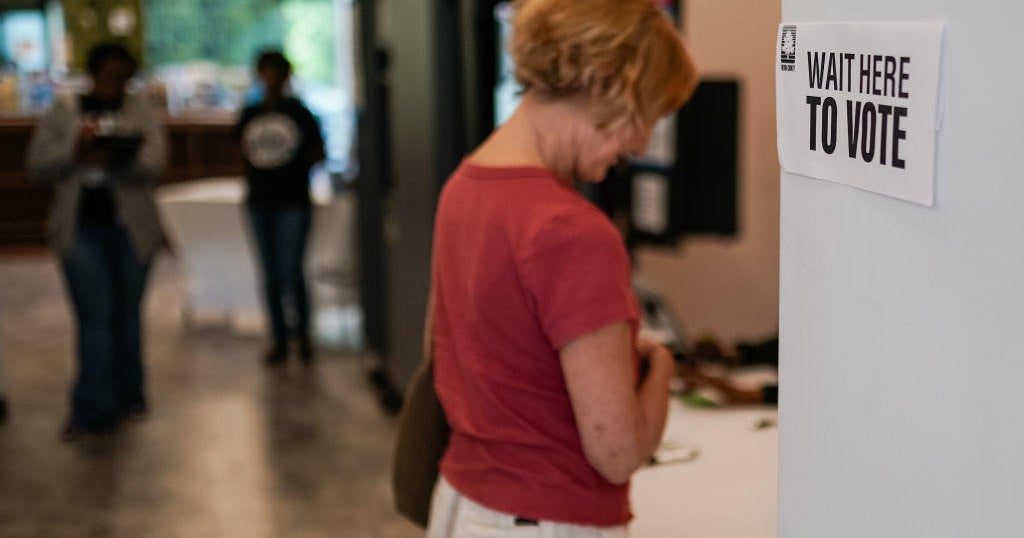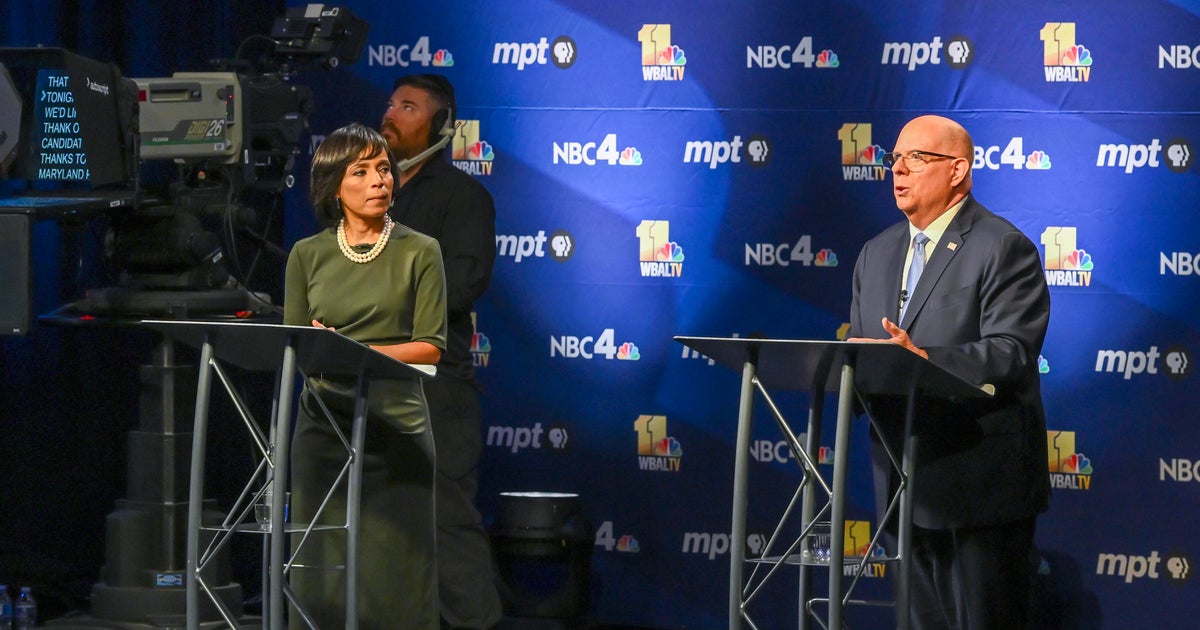CBS News
Supreme Court hears case involving Idaho abortion ban and federal law for emergency care today

Washington — The Supreme Court on Wednesday will hear arguments in a case that pits Idaho’s near-total ban on abortion against a federal law that requires hospitals to provide stabilizing care to patients experiencing medical emergencies.
The dispute between the Biden administration and Idaho officials in the case known as Moyle v. United States is the second the justices will hear in the span of a month that follows the Supreme Court’s decision less than two years ago overturning Roe v. Wade. The outcome of the case could determine whether the Biden administration can require hospitals in states with stringent abortion laws to offer pregnancy terminations in emergency situations.
The court fight involves the Emergency Medical Treatment and Labor Act, or EMTALA, which requires hospitals that participate in Medicare to stabilize patients facing an emergency medical condition.
The Biden administration argues that in some cases, that treatment will be abortion care, and in July 2022 — following Roe’s reversal — it told hospitals accepting Medicare funds that physicians must offer abortions in certain medical emergencies. If a state law prohibits the procedure, or includes an exception that is more narrow than what EMTALA provides, it is overridden by the federal law, the Centers for Medicare and Medicaid Services said.
But Idaho officials, and opponents of abortion rights, say EMTALA is silent on whether stabilizing care includes abortions and it cannot displace a state’s own restrictions on the procedure.
Under Idaho’s law, which took effect after Roe’s reversal, abortions are only allowed when necessary “to prevent the death of the pregnant women,” or in cases of rape or incest. Physicians who perform abortions in violation of the measure may be charged with a felony and face up to five years in prison.
The Biden administration sued Idaho in August 2022, arguing its law is preempted by EMTALA. A federal district court in Idaho sided with the federal government and allowed physicians to perform abortions in certain emergency situations.
A three-judge panel of the U.S. Court of Appeals for the 9th Circuit then allowed the law to be fully enforced while litigation continued. But the full 9th Circuit, which reviewed the panel’s ruling, reinstated the district court’s order in October.
The Supreme Court in early January said it would decide whether EMTALA overrides state laws that prohibit most abortions, but allowed Idaho to continue enforcing its ban in certain emergency medical situations until it issues a decision, expected by the end of June.
The fight over EMTALA
EMTALA was enacted in 1986 to address concerns that hospitals were engaging in “patient dumping” by discharging or transferring patients who did not have insurance. The law created a national minimum care standard for hospitals participating in Medicare by requiring them to offer stabilizing treatment to any patient with an emergency condition that threatens their life or health.
The Biden administration argues the Health and Human Services Department, Congress and health care providers have long recognized that EMTALA requires hospitals to offer abortions when necessary to save the mother’s life or prevent serious harm to her health.
While stabilizing care sometimes involves terminating the pregnancy, instances where EMTALA and the Idaho abortion ban are at odds are rare, Solicitor General Elizabeth Prelogar told the Supreme Court in a filing.
If a condition arises later in pregnancy and the fetus can be delivered, there is no conflict between the federal and state laws, she wrote. But it does arise when a pregnant woman is suffering from an emergency medical condition that, absent ending the pregnancy, threatens serious harm to her health, but not her life, Prelogar continued. In those circumstances, EMTALA overrides the Idaho ban, she said.
“Delaying care until the woman’s condition deteriorates and the doctor can say that termination is necessary to prevent her death, as Idaho law requires, stacks tragedy upon tragedy with little additional likelihood of fetal survival,” Prelogar wrote.
The Biden administration has argued that the gap between what EMTALA requires and what is allowed under Idaho’s law — an abortion to protect a mother’s health versus an abortion to save her life — has “devastating real-world consequences.”
“Many pregnancy complications do not pose a threat to the woman’s life when she arrives at the emergency room — but delaying care until necessary to prevent her death could allow her condition to deteriorate, placing her at risk of acute and long-term complications,” Prelogar wrote.
Bloomberg
If Idaho prevails and the Supreme Court agrees that state abortion restrictions supersede EMTALA’s stabilization requirement, Prelogar warned it would allow care under the law to vary from state-to-state, “thwarting Congress’s promise of essential emergency care to all Americans.”
But lawyers for Idaho’s Republican legislative leader argued that EMTALA does not include a requirement for abortion care, and they accused the Biden administration of recasting the law as an abortion mandate.
“EMTALA is not [the Department of Health and Human Services’] Trojan horse for nationwide abortion rules. EMTALA nowhere mentions abortion,” Republican state lawmakers said in a filing to the court. “Reading EMTALA as empowering HHS to displace state abortion laws defies the usual expectations of how Congress legislates and distorts the Constitution’s separation of powers.”
Led by Idaho House Speaker Mike Moyle, the GOP lawmakers claimed that the Biden administration’s reading of EMTALA is an “intolerable federal power grab,” and they called the law a “patient-dumping statute, not an abortion-access statute.”
In a separate filing from Idaho’s attorney general, state lawyers, alongside the conservative legal group Alliance Defending Freedom, claimed the Biden administration is attempting to “create a nationwide abortion mandate” in emergency rooms that participate in Medicare.
“It would allow the federal government to pay hospitals to violate state law, exempting emergency-room doctors from the state-law standards of practice that govern the treatments they are authorized to provide,” Idaho Attorney General Raúl Labrador wrote. “Nothing about that nullification of state law is narrow, and it is not, and will not be, limited to abortion.”
Labrador, a Republican, told CBS News chief legal correspondent Jan Crawford that Idaho’s law and EMTALA do not conflict.
“There’s a lot of misinformation of what the Idaho law does, and it’s really important for people to understand that if the life of the mother is in jeopardy, Idaho law actually allows an abortion,” he said.
Labrador accused the Biden administration of “trying to scare people into believing that women are going to die.”
The landscape after Roe’s reversal
Idaho is one of 14 states that outlaw abortion with some exceptions, according to the Guttmacher Institute, a pro-abortion rights research organization, while another seven outlaw abortion in the first 18 weeks of pregnancy.
A group of 22 states, many of which have the most stringent abortion laws, are siding with Idaho in the dispute, arguing that the Biden administration is attempting to invalidate state laws that protect the unborn.
No physician has been prosecuted or charged in Idaho for violating its ban. But the battle before the Supreme Court demonstrates the fallout from its decision unwinding the constitutional right to abortion and the challenges for physicians who are navigating states’ narrow exceptions to their abortion bans.
Dr. Jim Souza, chief physician executive for Boise-based St. Luke’s Health System, said there is now “second-guessing” and “hand-wringing” about whether an abortion can be performed within the bounds of Idaho’s law.
In 2023, when Idaho physicians could provide abortions in certain emergency situations under the district court’s order, one patient was transferred out of state, Souza said. But in the months since the Supreme Court has allowed Idaho to enforce its law in all circumstances, six patients with medical emergencies have been flown out of state, Souza said. He estimated that number will rise to 20 by the end of 2024.
While supporters of abortion rights are sounding the alarm about the consequences of a decision in favor of Idaho, the case has not received as much attention as a second abortion-related challenge heard by the Supreme Court last month, which involves the widely used abortion pill mifepristone.
In that case, a group of anti-abortion rights doctors and medical associations argued the Food and Drug Administration undertook a series of unlawful actions that made the drug more easier to obtain.
The Supreme Court appears poised to reject the challenge on procedural grounds. But that court fight and the dispute involving Idaho’s abortion ban and EMTALA underscore the chaotic landscape for abortion access in the wake of Roe’s reversal. Decisions from the high court in both of those cases are expected by the end of June.
CBS News
Suspected serial killer Bruce Lindahl linked to 1979 cold case out of North Aurora, Illinois

CHICAGO (CBS) — Police suspect Bruce Lindahl was a serial killer who targeted mostly female victims in Chicago’s western suburbs in the 1970s—and now they say they have tied Lindahl to yet another victim.
Police vowed to provide answers to the families of Lindahl’s suspected victims. The latest murder case they say they have solved dates back 45 years to 1979.
The body of Kathy Halle, 19, was discovered April 24, 1979, in the Fox River south of the I-88 bridge in North Aurora. She had been missing almost a month.
Her body was found by a boy fishing near her apartment. Now, authorities are connecting the murder to Lindahl.
Lisle Police Department investigators told CBS News Chicago back in 2020 that they were determined to connect the deaths of multiple women to Lindahl—who police say killed himself while killing another victim, Charles Huber, in 1981.
Lindahl is also linked to the 1976 murder of Pamela Maurer, a 16-year-old girl who left her home to go get a soft drink. The next morning, her body was found on College Road in Lisle—she had been strangled and sexually assaulted.
In 2020, police exhumed Lindahl’s body and used DNA to solve the Maurer case. Now, Halle is the latest victim to be tied to Lindahl.
North Aurora police and the Kane County State’s Attorney’s office are set to hold a media briefing on the Maurer case on Wednesday—where more details are expected to be revealed. It is known that DNA was used to help solve the horrific mystery.
CBS News
Russian disinformation groups promoting false claims about Gov. Tim Walz, experts say

Russian disinformation groups likely orchestrated baseless claims targeting Minnesota Gov. Tim Walz, falsely accusing the vice presidential candidate of sexually assaulting his students while he was a high school teacher, according to assessments by the U.S. intelligence community, independent researchers and a CBS News analysis.
At least four separate claims have spread since early October, racking up millions of views on social media platforms including X, owned by Elon Musk. Darren Linvill, co-director of the Media Forensics Hub at Clemson University, said at least two of the claims seem to be directly linked to Storm-1516, a Kremlin-aligned troll farm.
A Tuesday report from the Office of the Director of National Intelligence says the intelligence community found Russian disinformation groups were behind recent “manufactured and amplified inauthentic content claiming illegal activity” targeting Walz’s earlier career.
The claims
The initial claim emerged on Oct. 5 during a Rumble livestream, where an anonymous man said Walz abused him when he was a Future Leaders Exchange, or FLEX, Program student in Minnesota from 2004 to 2005. The man, whose voice appears altered, was interviewed by John Mark Dougan, a former Florida sheriff’s deputy living in Russia with alleged ties to disinformation campaigns.
This was the first sign that the claim was created by Russian disinformation groups, Linvill said.
“To have [Dougan] out there being interviewed on this story is basically a neon sign saying that maybe it’s connected to Russia. Not only do I think Russia is behind these stories, I think Russia wants us to know that they’re behind these stories,” he said.
Both the U.S. State Department and FLEX told CBS News they have no record “of any FLEX student from Kazakhstan in Mankato area schools from 2000 through 2020.” Mel Helling, the communications director for Mankato Area Public Schools, told CBS News they have no record of the allegations. NewsGuard first reported the claim.
When contacted by CBS News, Dougan claimed he has the alleged victim’s U.S. visa and the FLEX Program certificate. CBS News reviewed the documents and found several inconsistencies: The date of birth on the visa does not match the age the alleged victim stated in the livestream and the certificate has an incorrect logo on it.
The claims were picked up by other accounts that are not linked to Russian disinformation. On Oct. 12, an X account credited as Matt Wallace posted a Rumble video where he claimed without evidence that Walz may have acted inappropriately with the students during trips to China. The video was later removed and the user did not respond to a request for comment.
A third claim surfaced on Oct. 13 when an X account dubbed “Black Insurrectionist” posted grainy screenshots of supposed emails alleging Walz’s misconduct with a minor at a concert in 1995.
The supposed emails appeared manipulated. Among the clues was a comma in the date-time stamp that is not typically found in emails. “Black Insurrectionist” later deleted their account. Researchers have not linked this account to Russian disinformation.
On Oct. 16, another claim circulated when a man purporting to be Matthew Metro, a former Mankato West High School student, posted a video alleging Walz sexually assaulted him in 1997.
However, The Washington Post and AFP reported that a man named Matthew Metro did attend the school but the person in the video is not him. The Post interviewed Metro, who said he never met Walz.
Hany Farid, a professor at University of California, Berkeley, who specializes in manipulated media, said he believes the video was not created using AI; rather, he believes it is a “cheap fake,” in which a man is impersonating someone else.
A disinformation pattern
The video resembles the work of Storm-1516, Linvill said. The disinformation group previously promoted a false claim that Vice President Kamala Harris was involved in a hit-and-run incident, according to a report by Microsoft.
“Suggestions of sexual deviance in various forms are a favorite theme of Storm-1516,” said Linvill. “This campaign has recently turned from a focus primarily on the war in Ukraine to more frequent targeting of the Harris-Walz campaign.”
Linvill said versions of the Walz allegations appear to be a Storm-1516 “narrative laundering campaign,” a process of presenting false claims in a way that makes them appear credible. This often includes presenting the claims through a person who claims to be a victim.
CBS News reached out to X and Rumble for comment but has not heard back as of publication.
CBS News
Georgia Supreme Court won’t step in to reinstate controversial election rules

Georgia’s Supreme Court rejected a Republican-led effort to implement more than half a dozen controversial new election rules before Election Day.
In a brief order issued Tuesday, the court declined to reinstate the seven new rules implemented by the State Election Board, and declined to consider an expedited appeal — effectively ending the effort to get the new rules in place in time for the upcoming election.
A lower level Georgia judge on Oct. 16 declared the rules “illegal, unconstitutional and void.” The rules, which include one that requires ballots to be hand-counted and two related to certification of results, were supported by three of the State Election Board’s five members, all of whom were endorsed by former President Donald Trump.
President Biden defeated Trump in the state in 2020, and Trump has since repeated disproven claims that fraud cost him the election.
The new rules were opposed by not just Democrats, but also state Republican officials who cast doubt on whether they were legal. They said a hand count could delay election results, and argued in court that it was too late to properly train election workers on the new responsibilities.
Other rules passed by the board — include one that would have required county officials “to examine all election related documentation created during the conduct of elections,” a potentially laborious process — and another that would have required them to conduct a “reasonable inquiry” before certifying results. That rule did not explain what a “reasonable inquiry” entails.
The Georgia Supreme Court didn’t outright reject the appeal. In the order Tuesday, the court said it is declining to fast forward proceedings.
“When the appeal is docketed in this court, it will proceed in the ordinary course,” the justices wrote.









